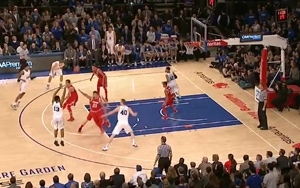 Microsoft will use data from Bing to help basketball fans feel a bit more educated when making predictions about winning and losing teams. The deal syncs Bing data with the National
Collegiate Athletic Association (NCAA).
Microsoft will use data from Bing to help basketball fans feel a bit more educated when making predictions about winning and losing teams. The deal syncs Bing data with the National
Collegiate Athletic Association (NCAA).
The NCAA March Madness bracket experience, created by Microsoft in a joint venture with the NCAA, relies on Bing Predicts’ intelligent
machine-learning technology to analyze social and search signals.
NCAA statistical data will help fans build a smarter bracket with match-up predictions from Bing. The analysis and additional
features aim to help fans mange the possible outcomes for all 67 tournament games.
Fans running Windows 10 on their PCs, phone or tablet can download an app. The NCAA has built a universal app
for Windows 10 that pulls in features so fans can experience the tournament whenever and wherever they go.
A live tile pinned to the Start menu provides instant updates on favorite teams. The
tile provides live alerts on upsets, overtimes, and close games, and live video streaming of all 67 tournament games.
The NCAA seems to be all in on the idea, except for the fact that the data
could be used for gambling. "We know fans enjoy filling out their brackets on Selection Sunday, however, we also know that money does not need to be involved for bracket activities to be fun," Mark
Lewis, NCAA EVP for championships and alliances, wrote in an email to
The Associated Press. "The bracket lets fans know when and who their team is going to play."
Rather than link the data to gambling, the fans should use the data to gather information about all
of the teams in the tournament in an effort to determine whether their favorite team or another will get to the Final Four, and who will ultimately win the championship.
Bing’s smarter
bracket becomes available on all devices after Selection Sunday, March 13, on Bing.com.